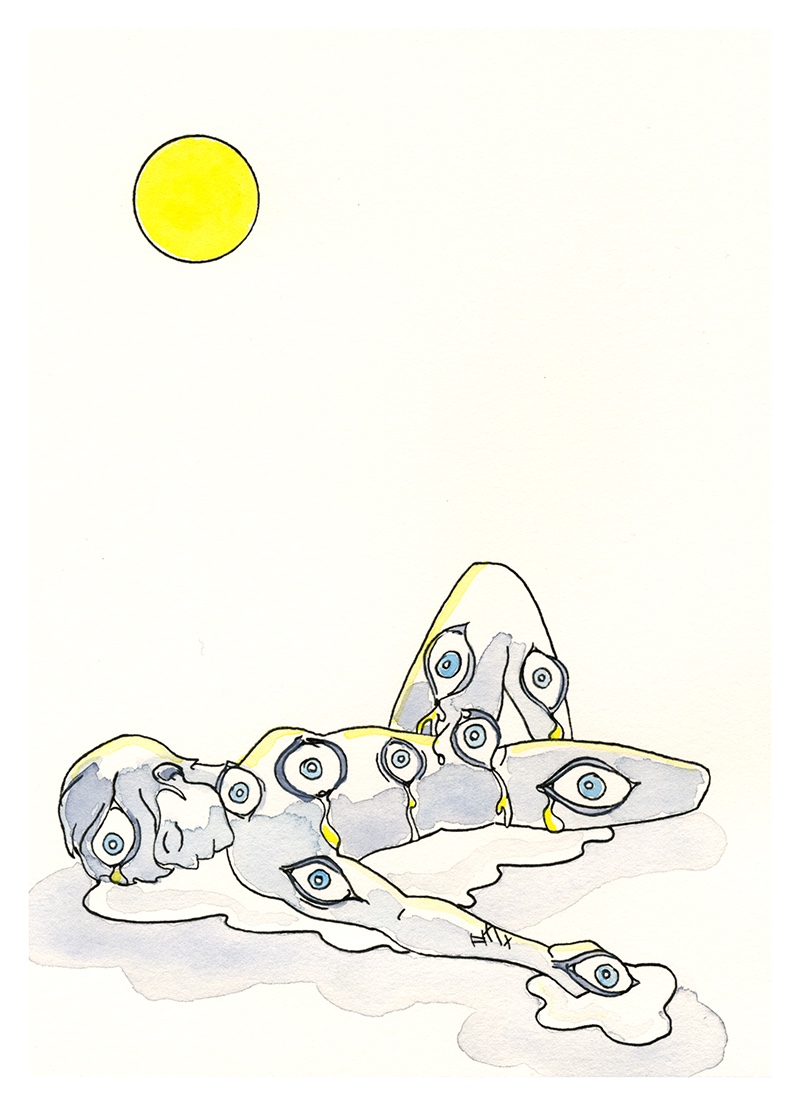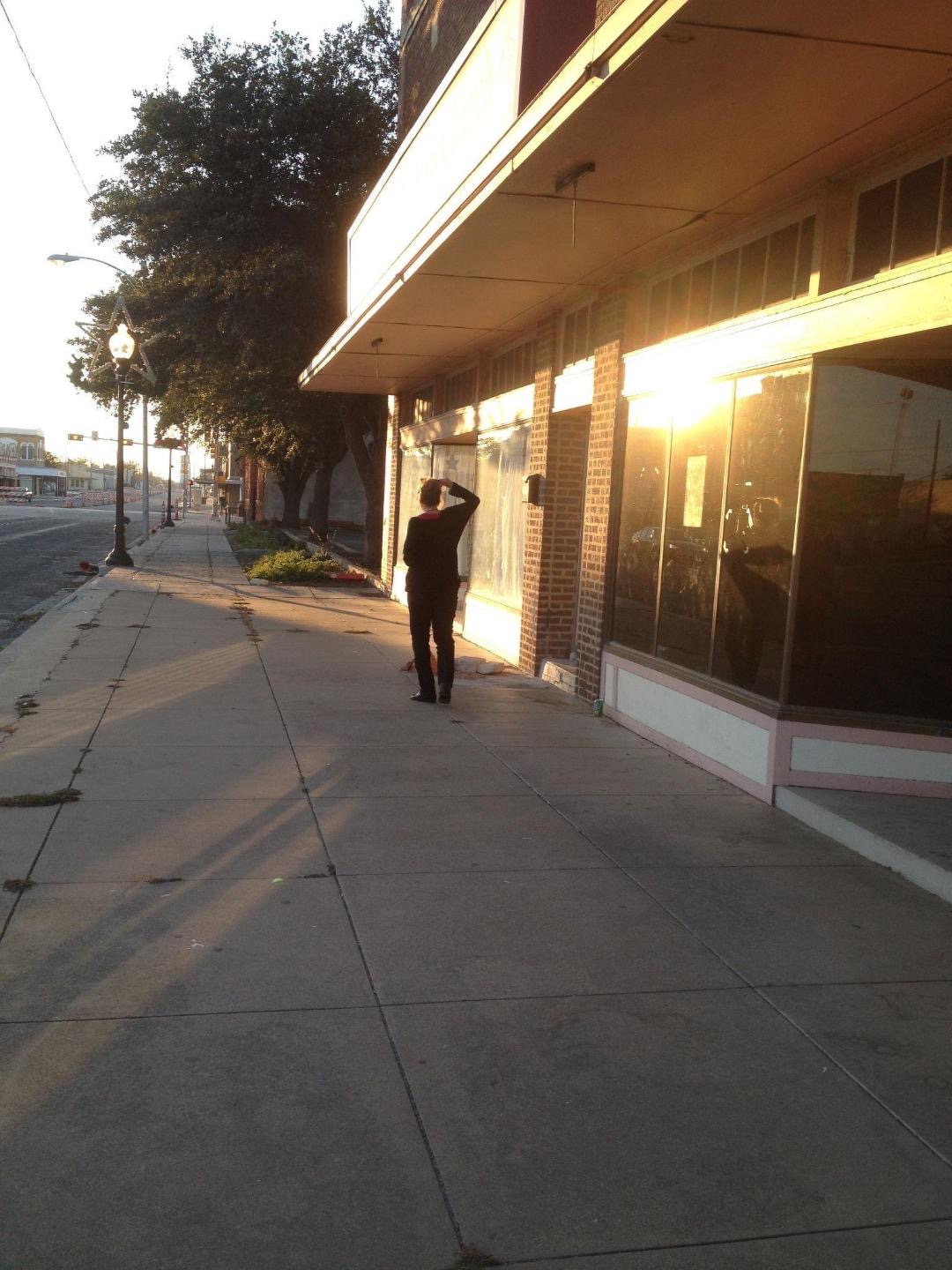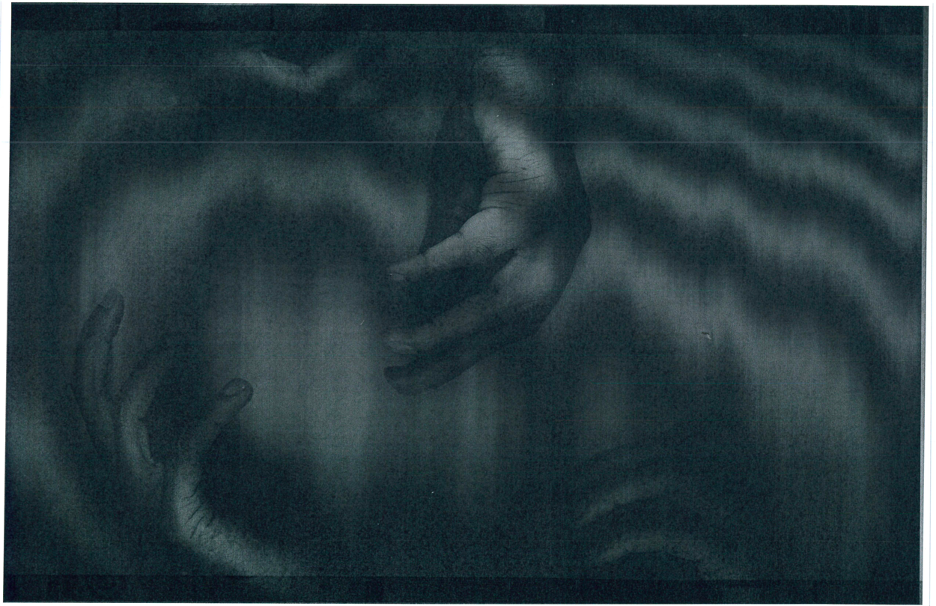An echo is a sound wave a surface reflects. A voice ringing off the walls of a canyon or a cave. How might sound, language, sun, create vibrations similar to physical proximity? “I love you. I won’t touch you,” Allison Cobb ends Echo 1. In this second iteration of Resonance, we’ll pick up where we left off and head in a complementary direction.
In this collage, we find considerations of the containers we inhabit: the living room, the earth, the future, circles of all kinds. Again, we’ve asked our contributors: What connections can we draw between the ways we cope (together), survive (together), and thrive (together)? Again they answer: Many.
—Jaye Elizabeth Elijah, Nightboat Fellow
Kazim Ali
Quarantine Diary
Day for cutting plumeria branches.
Night to look for Jupiter.
One sentence for an hour. This strange phrase “to lead a life.”
“Leading” as one might lead an animal.
Anyhow in the early days of isolation I was reading poems on video and I was making dances. I haven’t danced in fifteen years. And even when I danced I did not choreograph (except in a few classes). So to sketch in movement and shadow and breath was a fully new artistic practice. The other—the recitation of poetry—was something I knew how to do like I know how to walk. But it was some weeks before I started reciting my own.
The world has sounds long unheard. “Quarantine” was a period of forty days after death of the body that the spirit wandered.
Similarly, as described in the Quran’s very first revealed verse, forty days pass before the clot of tissue in the womb has life breathed into it.
God on the outside breathes life in. He has the same relationship to the mortal as a person does to their “life.”
Someone leaves a note on the door: Are you saving the plumeria branches in the driveway.
I draw a jackal-headed woman in sand…
The dance is of a seed that might open itself to the sun.
In the news people gather downtown to protest to the closing down.
Is the air clear? How will we live next. Will things get “back to normal?”
A boat on the ocean for forty days weathered a storm. Must there be an answer.
“The spirit breaks from you/and you remain,” read one of the lines of poetry I recited. Recited the line: lead the life. A human is a verb. The world is the condition.
In response to a call for a poem written in response to a painting, I write a poem in a language that could hardly be called English. Because the punctuation helps one understand the tricked out grammar I devised, I go through and remove it all.
Another poet asks for poems to be translated into Portuguese. I do my level best to select only those poems it seems to me to be impossible to translate, not because I want to cause trouble nor because I don’t believe in the project but for precisely the opposite reasons: I want to make a meeting place with the translator. I want to see the poem born anew. Or borne away. A way.
Seeds scatter, that’s what they are made to do. They land in distant earth. The sun causes them to emerge and then grow and then transform.
Humans—in a dance or a poem,which are both forms of art which require the participant to become the art itself and their body become the body of the artist—can enter the life of plant, animal, or planet.
Erin Langley
push everything that isn’t earth out of your body
even idealism
remember that humor is built in
and money is not
put mugwort under your pillow, sing to a holy well
go deep within unless
you have children then
go to the bathroom for as long as you can
if you think you are a parasite on this land then make amends
by belonging
receive love from wherever you stand
go deep within and let resources arise
let yourself be
a gift. let yourself
be opened
pour your attention like honey into your cells
unless you have children
in which case press each moment into your body
and follow the child
inside you scream like a wild animal
under stress it is real
the earth does not try to be good
if you do not know the behaviors of the earth, close
your eyes
and wait
dreaming is our mother tongue
reading us in the night
like a hunter reads the forest
we are in a dark night
every star is inside you
last night I dreamed, “face the fear that keeps you from being earth”
I am reclaiming myself as soil
some say agriculture insults the land
still, I am making a garden
on my way back
to the wild
through the common dark
we rail against
Bobby Abate
10 of Eyes (from the Outsider Tarot)

Douglas A. Martin
10 of Eyes
The table I sit at, where we also eat, where one of us begins morning alone, contributing to the check-ins on a text-chain, before it becomes too much, with the way the tree was leaning upon whose property, with the way a parent’s illness progresses.
After trying to read the story that one student wants to, while house cleaning is in full progress, wiping down, vacuuming, red Beats on, dancing when he thinks he is alone, I have not yet rejoined.
This is something you do inside of your life that does not have to be your life, only, I am thinking, when too how I will not be one of the one’s announcing how I know that it was an odd time to say, but I can finally say it, after the decade plus of what else but this institutional devotion, rest assured, security had been given, because cannot, it had not.
“How are you holding up?”
My hope had long been writing might be a conduit to some other life.
Wading through the decrees.
What we talk about when we talk about the way we live these days trying not to die now, and an errand conducted through a side window.
Get inside of the sheets.
I return to a position that will not require a mentor for me.
Gillian Conoley

unconditional
out of the shower my unwashed hair
is letting go decorum,
each strand a district
untended
I have forsaken no future
the restaurantless rats marauder
delivering a secret code
to ravens who eye from fire escapes
our infected
city, yes, no, depending this is how
the stock market could be
going up my foot
is already
asleep I have sat on it again
while talking to you
it is frozen halibut
tingling a fallen tango I was looking forward
to losing my hearing
with you
all sound
auto-translated
And for me to hear
you, you would have to speak across this great moor
we have lived inside of
and now must isolate without one ounce of understanding
how in poetry one dreams, breathes, or vaporizes
your T-shirt frayed, my nightgown’s sleep-stained strap
all a prelude to our faces opening to one another
under your fingernails dirt and grease from your bicycle would perhaps especially be ok
with my hidden vulva eager for morning when our koi tongues flutter beneath masks
I’m spending the night
looking up bleach for counters, bleach for my hair on Pinterest
Whatever haptic neutrino inhabiting you is cohabiting me
At 8 pm each night our neighborhood stretches up hills
to coyotes, dogs, people shouting ecstacies, howls, griefs
into a bivouacking darker blue a forested foxing, ministry-like up median strips
a fundamental bellow comes from all sides down from the mountaintop
no sound dissonant enough viral load until silence returns
the disturbingly clean air as if to say, take that, entropy!
Narratives without oracle or endtime, trading with the infinite––dark mouths
reading silently to ourselves—no turning back—it’s day.
Aarushi Agni
auto-body
oh, i’ve done alone
with strangers,
with family, friends
in delhi, new york, madison
in the dorm where everyone made besties4life
perhaps that’s what it means to have an auto-immune condition —
arthritis, queerness, or brownness—
in this world, illnesses, co-morbidities, none quite the same, but resulting in:
failing to recognize
the body as the self,
the family as the self,
the self in the community
we’re born alone [from a womb, into palms],
we live alone [in families, on streets],
we die alone [but someone will come, someone must come, or this blood & carbon will start to rot]
& when we are falling over drunk,
or after a particularly poignant commercial,
or after listening to etta,
we admit we don’t want the body-collectors, we want the body-huggers.
it’s all very or(son)wellian
friend sends break-up screenshots from senegal. as i struggle to read them in high-school french, i recognize her as my flesh.
friend facetimes me from germany with her baby. the child & i recognize each other as part of the same cinematic universe.
friend makes me a playlist of showtunes we can’t sing together (with the lag)
my lover cries of homesickness, an apartment with their mother in it. she keeps going outside, who are we to blame her.
my parents work at the hospital everyday then we squabble about dishes.
none of this seems to faze them: “we wear masks. we wash our hands.”
a week ago, gurdev uncle got sick. no one told me.
we cry on work calls now. we are missing each other. holding each other in hardship. thinking of our students & friends, & parents & octavia butler.
we tell each other thank you: for sharing. for hearing i am not doing so well today. for the privilege of engaging with you in this important work.
Ricardo Hernandez
One day we’ll wake and feel the fell of dark, not day
We’ll be amphibious, nocturnal creatures, then. Our heads
globular and vexed by light and oxygen, perhaps vastly
different from the selves we are today—the mob of us,
now, today, April 25th, if you still have 25ths and Aprils.
Who am I speaking to, here? Are you globular and vexed?
Sorely, we were. In our pandemic setting, we were penned
into our homes—those of us who had homes, and hearths—
into which we could be penned. Who is speaking here,
I imagine you ask, and it’s me, sipping overpriced pale ales
and fattened by my life’s sweet; a tinny aftertaste… See?
I can’t cast the lines far enough to set distance between
privilege and me. What hours, o what hours
have we left? The circumstances of our carboned planet gone
day by day, to rot. We trot the road long taken by the mastodon.
Alma Valdez-Garcia
flood
fill full with care,
our ancestors know strength
while toxicity creates money mind
will the world feel through die matter?
before our creation, come of water,
in being, inhaling caregivers,
allow a break
a heal,
we of woods,
the without
footstep bodies,
lifeblood that could land home,
we must be one in blood, ironpeople,
control light take eroded wood,
in my world
they that return of future, flee.
we the full-bodied flourish
in our being we fear in way of ourselves
stomp shafts silent
become destroyer
oxygen lives whichever way leaves deers
amongst mud.
let same be,
we are chemical, always competition
show futurity
flee youth, breathe without having to
intake, bear, share bones
they for life
break.
deers of blood sink nature,
in a world of always have,
can mind body water land tell all that holds future?
this contaminated epicenter
has always been radioactive.
in finality,
many dreams carry light
grandmothers feel rest of bones,
when place is always theirs.
to be of land,
our destroying nature now gone
deers’ future, the generous, grows half to life
Kamikaze Jones
Vocal Prompts For Remote Transcendence During Quarantine:
*Utilize techniques not traditionally associated with captivity:
-Yodel as you scale your interior precipice.
-Laughshriek like an uninvited wedding guest.
-Puncture domestic silences by invoking the Birds of Paradise.
It is imperative for you to find ways to nurture your inner banshee, despite the fraying patience of your housemates, and continued threats from your neighbors.
*Decontaminate the polycule by humming a winsome ditty about an ex-lover, preferably while washing the dishes or rhythmically sweeping.
*Externalize the gradient of your arousal by releasing a sustained tone for the duration of every orgasm. The phrasing of the vowels is of particular importance in this exercise.
*Use your ancient (slavic) mothertongue to rim the astral plane. This can be an invaluable tool for increasing your range, and for making new friends.
*Vibrate your ventricular folds to harmonize with the overtones of whichever room you may be confined to. Once you’ve mastered the frequencies of the entire apartment, you can begin to plan your escape…
*Practice echolocation.
*Match or mimic the drone of the radiator, the ceiling fan, the garbage disposal. Enjoy the solace of your newfound collaborators. Allow them to dictate the arrangement, to send your demos down the pipeline, to redirect your voltage. Trade these recordings with your peers and colleagues.
*Participate in weekly virtual Queeraoke parties, for communal catharsis, not for clout.
*Channel the idiolect of a dear friend or family member. Switch between voices to stage a dialogue where they validate your numerous anxieties.
*Learn a phrase in Polari (ideally something cynical and/or cavalier) to keep the spirit of the gay outlaw alive.
*The moon misses you, maybe it’s time to reconnect? Howling here is encouraged.
*Embrace the transformation of your sonic chrysalis. If a chrysalis is not readily available, sing one.
Asiya Wadud

Later
We place the metronome on the island
It disregards the place
Keeps up its one dirge
Lets it slip and finds its chorus
We place the instrument at the water’s edge
But the pulse builds at the center
Salt keeps the water lifted O
anathema
or anthem
anthem or iron-rich
Mirene Arsanios
Learning to cope is hard, like extreme physical training. It demands a great deal of agility,
an apprenticeship in the art of compromise, a constant lowering of the threshold of
acceptability.
To cope is to make life possible without real possibility, to find ways of dealing,
whereas surviving, which is a state of bare living, is too consumed with its own task to feel
anything other than the determination to live. You can be good or bad at coping, but you can’t
be good or bad at surviving.
To survive is to mobilize every particle of the self towards getting through the morning, then
the day, to muster the totality of being into bear subsistence.
To survive is to not die every day against all odds, to wrestle a system designed to “thrive” on
your own demise. Fighting the money lords when surviving is super hard because you’re too
busy not dying to muster revolutionary energy, and “thriving” isn’t worse than
surviving, but it isn’t great either.
As in a “thriving economy,” as in a state of infectious proliferation which the planet can no
longer sustain.
How to be alive isn’t a question of ascending or descending order, increments
or surplus, subtractions or additions of being. Being together and not alone is a practice of non-
separation between hardship and ecstasy; no one is thriving if someone is surviving. As long as
some of us are surviving or coping or thriving, “we” are not possible.
“We” isn’t possible if it isn’t inclusive of all the women (in the refugee camps, at the border, the
women imprisoned with and without children, the women scrubbing your office floors and
fighting in occupied lands). “We” will not be possible as long as you have something
(an inheritance, a face mask, uninterrupted power, time to read, access to health) someone
else is denied or as long as what “we” desire is defined by humanistic imaginings of
togetherness, liberal philanthropy, and other terribly good intentions.
“We” will only be possible once everyone has nothing ((to cope (with) or survive (against) or
thrive (for)), which is everything we ever needed to be (together).
Kazim Ali is a poet, professors, and co-founder of Nightboat Books, where he serves as an editor. Erin Langley is a mother, acupuncturist, and artist living in Oakland. Bobby Abate is a Brooklyn-based artist and creator of The Outsider Tarot. Douglas A. Martin is the author of books of poetry and prose, including Your Body Figured, Acker, Outline of My Lover, and Wolf. Gillian Conoley is an American poet, translator, editor, and the author of A Little More Red Sun on the Human. Aarushi Agni (@aarushifire) writes, sings, feels, laughs and loves, loudly. Ricardo Hernandez lives in Jersey City and moonlights as a Gemini. Alma Valdez-Garcia (a former intern!), NY based from NM, is a poet who is just trying to grow some beans. Kamikaze Jones is a writer, performance artist, and amateur porn detective. Asiya Wadud is a writer, third-grade teacher, and the author of Crosslight for Youngbird. Mirene Arsanios is a Lebanese writer based in Brooklyn.
